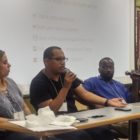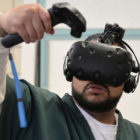
To Avoid a Crisis, Nonprofits Should Prepare and Know Their Mission
|
The notion that a noble mission and a track record of good deeds can shield an organization and its brand from crisis is a myth.
Juvenile Justice Information Exchange (https://jjie.org/page/96/)

In late September, Torri was driving down the highway with her 11-year-old son Junior in the back seat when her phone started ringing.
It was the Hamilton County Sheriff’s deputy who worked at Junior’s middle school in Chattanooga, Tennessee. Deputy Arthur Richardson asked Torri where she was. She told him she was on the way to a family birthday dinner at LongHorn Steakhouse.
“He said, ‘Is Junior with you?’” Torri recalled.
Earlier that day, Junior had been accused by other students of making a threat against the school. When Torri had come to pick him up, she’d spoken with Richardson and with administrators, who’d told her he was allowed to return to class the next day. The principal had said she would carry out an investigation then. ProPublica and WPLN are using a nickname for Junior and not including Torri’s last name at the family’s request, to prevent him from being identifiable.
When Richardson called her in the car, Torri immediately felt uneasy. He didn’t say much before hanging up, and she thought about turning around to go home. But she kept driving. When they walked into the restaurant, Torri watched as Junior happily greeted his family.
Soon her phone rang again. It was the deputy. He said he was outside in the strip mall’s parking lot and needed to talk to Junior. Torri called Junior’s stepdad, Kevin Boyer, for extra support, putting him on speaker as she went outside to talk to Richardson. She left Junior with the family, wanting to protect her son for as long as she could ...

The notion that a noble mission and a track record of good deeds can shield an organization and its brand from crisis is a myth.

Criticism is nothing new to people in the news business.
If you have spent more than a day gathering it, writing it, reporting it, printing it or posting it, you have experienced it. Readers need the news, but they don’t always like what they read. When they don’t like it, they let you know.

In all but 10 states, the families of children charged with crimes can be assessed fees to use attorneys appointed to represent them or billed for the cost of that representation, according to a new report.

People often talk about the art and science of fundraising. And they’re right. Raising money, especially gifts from individuals, takes a strategic mix of savvy relationship building and effective implementation of the right processes, plans and metrics. But there’s a third piece of the puzzle that we don’t talk as much about … attitude. Attitude dictates our level of confidence to engage donors, it impacts whether we approach our work with an abundance mentality or a scarcity mentality, and it infuses all the training and tools we’ve been given over the years with the organizational will to finally put them to use.

The current attempt to amend the felony murder rule in California has been a multiyear effort. This work, like all our work, was borne out of our personal experiences with clients, incarcerated individuals and family members with loved ones serving life sentences under this antiquated doctrine. This rule represented to us an injustice that deserved a remedy.

The toughest issue facing advocates working to abolish youth prisons may be what replaces them. It’s both an obstacle to change and a practical question that follows success.

The first time Danny Peters, 55, walked around Community Correction Center II, a halfway house in Philadelphia, he felt he’d been there before.

Bill Dorsey works as a shift supervisor at the Ada County Juvenile Justice Detention Center in Boise, Idaho. Outside of his daily duties, Dorsey also provides a valuable service to the youths held in detention — he teaches music. By providing guitar, mandolin and drumming lessons, Dorsey creates a space for kids to learn skills and find their passion by engaging in healthy, communal activities. Since Dorsey began his informal musical instruction, the detention center now incorporates a “healthy hobbies” program that includes gardening and fly fishing.